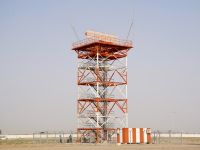The heydays of Christmas shopping on Hamra Street and in Downtown Beirut have become a short-lived memory for many merchants and traders who have seen their business sink to the lowest point in many years. Shoppers in most Hamra stores are nearly nonexistent, while shop owners spend a big part of their time outside their shops chatting with their neighbors about the miserable situation.
“Our situation has never been more miserable,” Nada Nahle, owner of Zebra clothes shop, told The Daily Star while reporting a drop in sales by over 60 percent.
“Our business is very slow this year and we are not feeling the Christmas spirit,” she said.
Nahle attributed the slowdown in business to the absence of Arab tourists. “I cut the prices of my goods by up to 50 percent but I am still incapable of attracting customers,” she said. “Some days pass without being able to sell even one item.”
Her comments were echoed by Mirvat, a sales person at Border clothes shop, who said that sale activity is continuously dropping year after year.
“We are witnessing a remarkable drop in our business despite our big sales of up to 50 percent,” she said, attributing this drop to the unstable political situation in the country.
“The deteriorating political situation in the country is weighing heavily on consumers’ confidence,” she said.
Likewise, Akram Sleiman, owner of Cavio clothes shop on Makdessi Street, said that people prefer to save their money or spend it on food instead of buying clothes in the midst of the prevailing political and security crisis in Lebanon and the region.
Sleiman said that sales have dropped by around 30 percent compared to last year’s Christmas season. “We used to rely mostly on our wealthy Syrian clients who visited Lebanon during the festive season but the restrictions imposed by the General Security on Syrians’ entrance to the country weighted heavily on our business.”
Sleiman explained that Syrians who are already living in Lebanon are emigrants and they do not have a great purchasing power. “They have other priorities and they prefer to spend money on their children’s schools instead.”
While most of Hamra’s shops have placed huge sales tags on their windows to attract customers, others show liquidation posters in an attempt to sell all their stock and shut down their businesses.
“We slashed the prices of our products by 70 percent for us to be able to sell all our stock and shut down the store in four months,” said Walid al-Masry, general manager at Venittini.
Masry said that Venittini saw a drop in sales by over 40 percent, caused by the absence in tourists and the low Lebanese purchasing power.
“The owner of Venittini is planning to shut down the store because he is barely capable of covering his expenses,” he said.
“Moreover, our rent is high and the shop owner does not want to cut rent price,” he added.
Likewise, owner of Barutti Clothes has also decided to shut down his business to stop losses. “I have never witnessed such a drop in sales,” he said. “I am not even able to cover my expenses and this is why I will be closing the store in two months approximately,” he said.
Barutti’s owner told The Daily Star that many shops in Hamra have shut down lately to cut their losses.
In fact, many shops, including Puma and Tresor, in this area have a “For Rent” tag on their windows.
But Hamra is not the only shopping area suffering from the current political uncertainty and economic recession. Most of the shops in Downtown’s Maarad Street are empty while others that are still operating there or in Beirut Souks are suffering from a remarkable slowdown in business.
“As you can see, we have no customers at all,” said manager of a luxurious clothes shop in Beirut Souks, who did not want to be identified.
“We usually rely on both Lebanese and foreigners but the absence of tourists this year caused a drop in our sales by around 50 percent,” he added.
Another high-end shop manager, who also spoke on condition of anonymity, said that business dropped by over 30 percent as a result of the complicated political and security situation and the absence of tourists.
Some high-end merchants did not give logical explanations behind the reasons that their business are still functioning despite the sharp drop in the volume of sales and the high rent they pay.
However, others such as the owner of Highstreet, a clothes shop in Maarad Street, said that his store is still operating because he owns the store and doesn’t pay rent.
“What is really helping us a lot is the fact that we own this shop and we do not have to pay high rental cost,” he said.
“But if sales activity remains slow we may consider to shut down the store,” he added.
Meanwhile, general manager at Samiia clothes shop in Downtown reported a sharp drop in sales due to the strict security measures, contrary to Samiia shops in other areas.
By Dana Halawi








